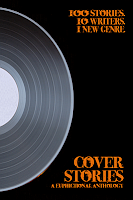Interview _ Erik Schmidt

Erik Schmidt lives in Georgia and is a sports editor and a freelance writer. 10 of his short stories appear in the anthology, Cover Stories: A Euphictional Anthology (CreateSpace, 2010). In this interview, Erik Schmidt talks about his writing: When did you start writing? I had to write fictional stories throughout elementary school, but I started taking it seriously — or at least as seriously as any 11-year-old boy can take anything beyond backyard football and baseball cards — in sixth grade. Our teacher, Mrs. Jacoby, consistently had us write 100-word essays and then read them aloud in class. I remember thinking some of the topics were boring or uninspiring, so I started creating my own themes for my own amusement. They weren’t anything special, but it was important for me to realize that innovation, creative thinking, and stepping outside the expected parameters are huge elements in the writing process. There was no epiphany or mind-blowing realization in regards to ...






